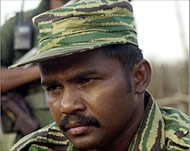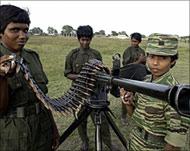A shot across Colombo’s bows?
A deadly bomb attack in Sri Lanka on Wednesday was a warning from the country’s Tamil rebels to the government not to stall the peace process any further, according to analysts.

A woman blew herself up in a police station after trying to enter the offices of an ethnic Tamil politician opposed to the LTTE (Liberation Tigers of Tamil Ealam).
Five people were killed in the explosion – the first of its kind in Colombo since a ceasefire was signed between the rebels and the government in February 2002.
Many in Sri Lanka believe the attack was the work of the LTTE, led by V Prabhakaran, who has been accused of ruthlessly eliminating his opponents.
The LTTE has, however, strongly condemned the killings, saying such acts caused “severe damage to the peace process”, and blamed “anti-peace elements” for the attack.
LTTE hallmarks
Analysts say the bombing illustrates how Sri Lanka‘s peace process has come to a grinding halt, and caution that the current ceasefire cannot be taken for granted.
Paikiasothy Saravanamuttu, executive director of the Colombo-based Centre for Alternative Policy, believes Wednesday’s attack was probably carried out by the Tamil Tigers.
“The LTTE never claims responsibility for this type of action so I wouldn’t pay much attention to their denials,” he told Aljazeera.net.
|
“The LTTE is warning Paikiasothy Saravanamuttu, |
“This attack clearly bears all the hallmarks of the LTTE. That said, if they have officially denied and condemned it, one cannot be 100 per cent sure.”
Saravanamuttu says the attack was meant as a message to the government in Colombo.
“This must be seen in the context of the situation in the east of the country where the LTTE says the government is fighting a proxy war against it.
“And, particularly, it must be seen in the context of the last few days during which an LTTE loyalist was assassinated in Batticaloa.”
Warning shot
According to Saravanamuttu: “The LTTE is warning the government, ‘If you try to get at us, we can put Colombo under a state of siege’.
“It is a reminder of the past and a warning about the future. A warning that the government better start getting serious about the peace process and start talks about some kind of interim government in the north and the east,” Saravanamuttu said.
The LTTE says it is fighting for a separate state, or autonomy, for the country’s minority Tamils in the north and east of the island.
Successive Sri Lankan governments, which are traditionally led by parties dominated by the majority Sinhalese, have refused to consider independence claims.
 |
|
Renegade commander Karuna is |
In 20 years of fighting, more than 60,000 lives have been lost.
A Norwegian-brokered peace process has been deadlocked since April last year when the Tigers walked out of talks, complaining the government had not honoured pledges.
In recent months, the LTTE has repeatedly accused the Sri Lankan military of waging a covert war against it using the breakaway Tamil commander Colonel Karuna.
Incidentally, Douglas Devananda, the ethnic Tamil MP who may have been the intended target of Wednesday’s attack, has claimed to have been in telephone contact with Colonel Karuna to help him establish a political party.
Covert support?
The Tigers blame Colonel Karuna for several attacks in the east, including the killing of a prominent journalist and four disabled rebel fighters.
The LTTE says it has “very reliable evidence … that the Sri Lanka army is using Karuna as a pretext to murder and to create mayhem in Batticaloa”.
Colombo-based analyst Saravanamuttu says there is probably some truth in the Tiger accusations.
“The government has denied any links to Karuna but it is unlikely that he would be able to mount these attacks without some financial and military support.”
 |
|
Tamil Tigers have been waging a |
Whatever the truth, thus far it is the Tamil Tigers that have been condemned for eliminating political opponents.
Earlier this year, Amnesty International expressed “grave concern” over the killing and abduction of tens of Sri Lankan citizens by the LTTE since the signing of the ceasefire agreement in February 2002.
The organisation said it had received information documenting at least 22 killings and 16 attempted killings, abductions and other human-rights abuses against members of Tamil political parties, their families and supporters.
Amnesty said it is “concerned that these human-rights abuses are part of a systematic campaign by the LTTE against other Tamil political groups opposing them”.
Opinion divided
The LTTE has denied any involvement in the killings and abductions, saying these were perpetrated by elements who wish to derail the peace process.
|
“The Tigers are keen to claim that they are the sole voice of the Tamil people, but … there are concerns that if they ran a Tamil state, there wouldn’t be the kind of political pluralism there is in other parts of Sri Lanka today” Liz Rowsell,Amnesty International |
But where do ordinary Tamils, concentrated mostly in the country’s north-east, figure in the political debate?
Saravanamuttu of the Centre for Alternative Policy says most of Sri Lanka‘s ethnic Tamils think the LTTE is their best bet of getting a good deal at the negotiating table.
But Liz Rowsell, a Sri Lanka researcher at Amnesty International, says there are splits within the Tamil community over the LTTE’s legitimacy.
“The Tigers are keen to claim they are the sole voice of the Tamil people, but I think there are differences of opinion on the ground,” she told Aljazeera.net.
“There are concerns that if they ran a Tamil state, there wouldn’t be the kind of political pluralism there is in other parts of Sri Lanka today.”
Colombo’s options
All eyes are now on Sri Lanka‘s government to see how it responds to Wednesday’s attack.
Analysts say the authorities cannot crack down too heavily on the rebels because that would jeopardise the peace process.
 |
|
No harsh crackdown on the LTTE |
They say security in Colombo will probably be increased but no high-risk strategies would be undertaken.
Predictably, President Chandrika Kumaratunga strongly condemned Wednesday’s incident, calling it an assassination attempt on the moderate ethnic Tamil politician.
But government spokesman Harim Peiris said it would not derail the peace process.
“It is the LTTE going after a political opponent,” he said. “It is that and absolutely nothing else. It [the LTTE] is resorting to violence to kill an opponent; it is not reverting to hostilities.”